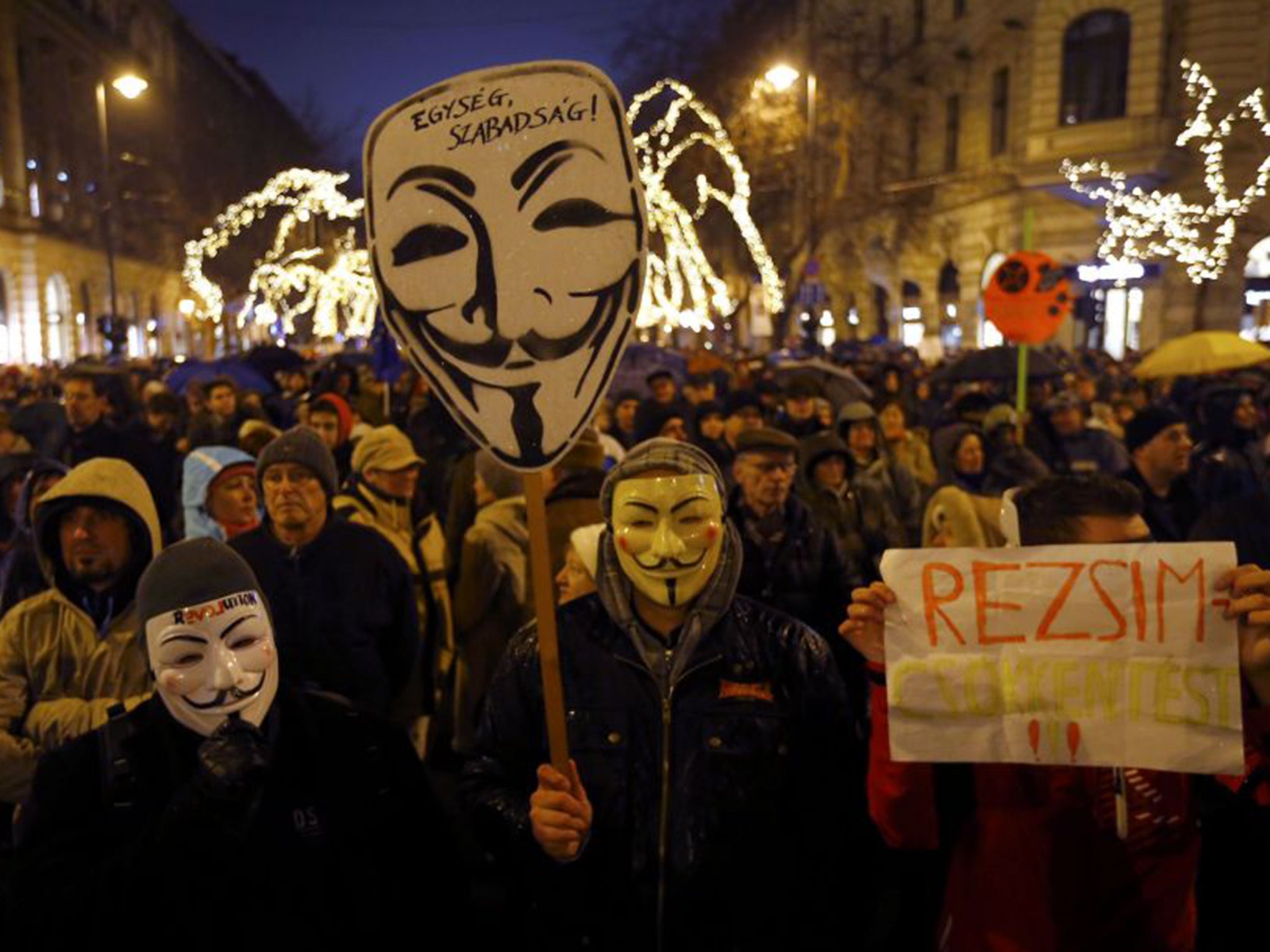Hungarians take to the streets over plans to tax the internet and drugs-test every teenager, journalist and politician
Hungarian leader Viktor Orban is steering his country away from the West and towards Russia with unorthodox policies

Tax the internet; mandatory drug tests for every teenager, journalist and politician; close every shop on Sundays. These are not the policies you expect from the government of a modern EU member state.
For Hungarians, they are becoming par for the course from the government of Prime Minister Viktor Orban, who has steered the country away from Europe and back towards its former Soviet master. Last summer, in a speech now infamous in Hungary, he praised the governing models of Russia, Turkey and China and set out his desire to create an “illiberal state”.
His more outlandish policies appear to be a distraction from his conflicts with the West. The plan to tax each gigabyte of internet traffic at 150 forints (£0.40) last October came out at around the same time as six unnamed Hungarian officials were banned from the US over corruption charges.
Mr Orban, 51, took power as the head of the conservative Fidesz in 2010 in the wake of an unpopular Socialist government and inherited a deeply troubled economy.
His unorthodox policies and championing of the Hungarian national cause have given him an unbending core support, despite him being named the second-most corrupt politician after Vladimir Putin by OCCRP, a Sarajevo-based think-tank.
“Fidesz and Orban were always really successful in keeping a core electorate that is strongly and emotionally attached to Viktor Orban,” says Peter Kreko, the director of another think-tank, Political Capital. “This is illiberal populism in action, not only in words.”
But his latest moves appear to have backfired. The backlash to the internet tax brought Hungary’s biggest-ever protests to the streets and forced the government to quietly drop the plan.
At a protest on Friday, thousands of demonstrators came out united against the government – waving EU flags while railing against Mr Orban’s illiberal policies. The protest was organised by MostMi, a civil society movement concerned about corruption and the concentration of power. Attendees at the protests have generally been young people who have seen many of their contemporaries, frustrated with the political stalemate, emigrate en masse to other areas of Europe.
Despite the numbers, critics say the movement lacks the credibility to put a dent on Fidesz’s overwhelming dominance on the Hungarian political stage. Though the party has only 25 per cent of the electorate’s support, according to a recent poll it is still well ahead of the next parties – the far-right Jobbik on 14 per cent and the Socialists on 11 per cent.
In last October’s municipal elections, Fidesz won the mayor’s seat in 17 of Budapest’s 23 districts, as well as in 20 of Hungary’s 23 biggest cities and an overwhelming majority in every county council.
As Hungary pulls further away from Europe, voters are responding. Fidesz suffered an unprecedented loss of popularity after the US travel ban, dropping 12 per cent in polls only one month after the triumph in October’s municipal elections.
But it has not been enough to galvanise the opposition. The problem, some say, is that the movement wants to remain apolitical, refusing to engage with opposition politicians. “At the moment we do not have political ambitions,” says Zsolt Varady, one of the founders of MostMi. “We refuse the politics of the last 25 years.”
The decision to refrain from traditional politics is exposing cracks in the movement, visible during Friday’s protest.
“Scolding the regime is not enough,” another front-runner, Gabor Vago, told those gathered. “We have to show an alternative by being self-conscious citizens”.
The confusion is keeping Hungary’s opposition from posing any real threat to Mr Orban, Mr Kreko said. “Since even the organisers have different points of views, it’s too early to represent a political manifesto. They can only amplify the negative sentiments of Hungarian society.”
Subscribe to Independent Premium to bookmark this article
Want to bookmark your favourite articles and stories to read or reference later? Start your Independent Premium subscription today.

Join our commenting forum
Join thought-provoking conversations, follow other Independent readers and see their replies